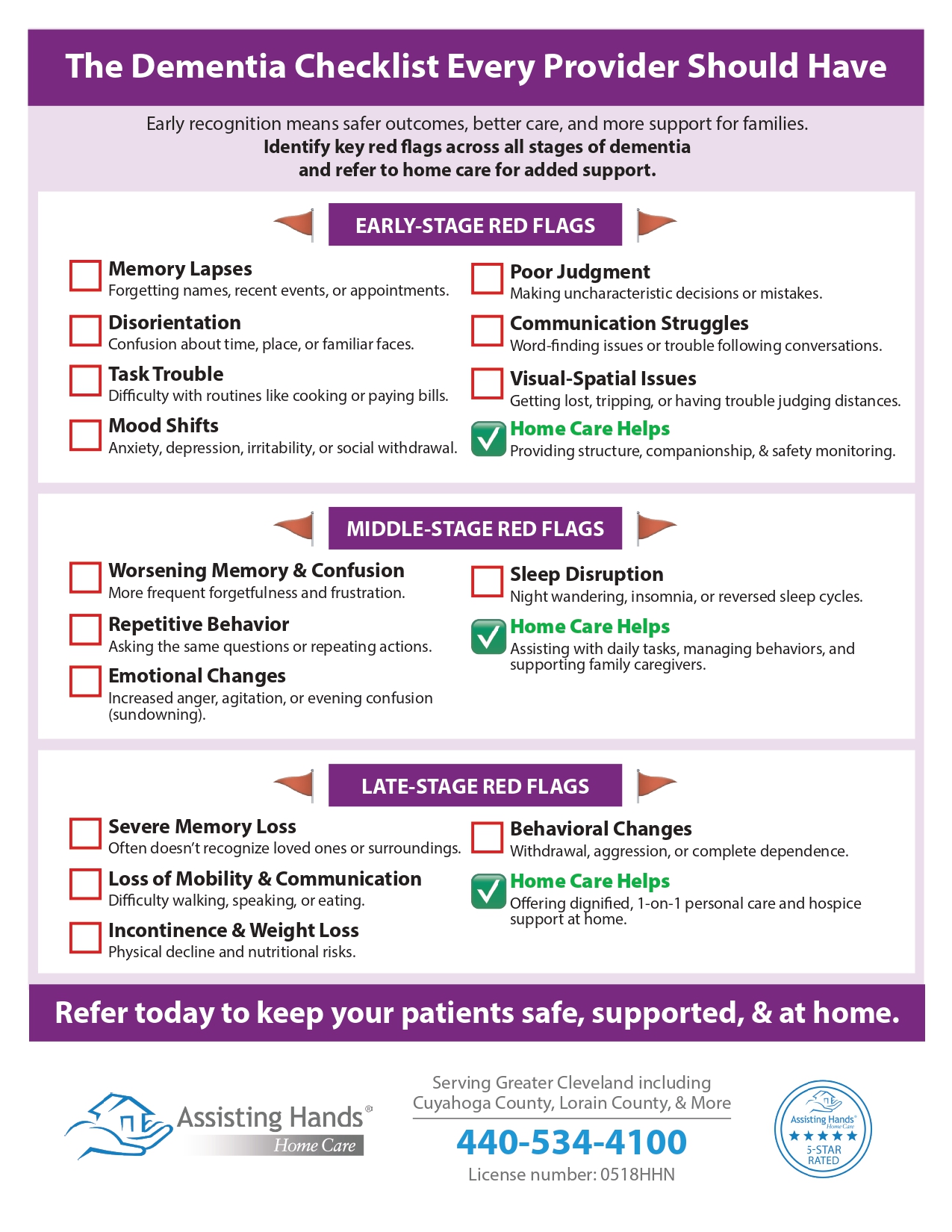

Dementia is not a specific disease—it’s a term that describes a group of symptoms affecting memory, communication, and the ability to perform everyday tasks. While every person’s experience with dementia is unique, the progression of symptoms tends to follow a pattern that can be grouped into three broad stages: early, middle, and late.
Understanding these stages helps families and caregivers anticipate changes, make informed decisions, and provide compassionate support tailored to their loved one’s needs. Whether your loved one has been recently diagnosed or is further along in their journey, this guide will help you prepare for what’s next—with practical advice and real-world insight.
According to the Alzheimer’s Association, more than 6.9 million Americans age 65 and older are currently living with Alzheimer’s disease, the most common form of dementia. That number is projected to reach 12.7 million by 2050 unless medical breakthroughs change the course of the disease. Meanwhile, the World Health Organization (WHO) reports that over 55 million people globally are living with dementia, with nearly 10 million new cases diagnosed each year.
Despite these staggering numbers, many families still struggle to recognize the signs early or understand how the disease progresses. That’s why education is key—not just for healthcare providers, but for anyone caring for a loved one with memory concerns.
Stage 1: Early Stage Dementia (Mild Cognitive Decline)
The early signs of dementia can be subtle—so subtle, in fact, that many families mistake them for “normal aging.” Yet this stage is where timely recognition can make the biggest difference in a person’s quality of life. At this point, individuals can typically still live independently, but cognitive changes begin to interfere with decision-making, conversation, and daily routines.
Red Flags That May Signal Early Dementia
- Poor Judgment: You might notice your loved one making unusual financial choices, such as giving away large amounts of money or falling for scams. These are not just “quirks”—they’re early signs of compromised executive function.
- Communication Struggles: Frequent pauses to find the right word, losing their train of thought mid-sentence, or struggling to follow conversations are common early warning signs of cognitive decline.
- Visual-Spatial Difficulties: Trips, stumbles, or trouble with parking the car may indicate visual-processing issues that often accompany early dementia.
- Memory Lapses: Forgetting appointments, repeating stories, or misplacing objects in odd places (like a phone in the fridge) are signs the brain is beginning to struggle with short-term memory.
- Disorientation: Even in familiar environments, a person may ask, “Where am I?” or become confused about the time of day.
- Task Troubles: Previously simple tasks—managing a checkbook, cooking dinner, or remembering medications—may become overwhelming.
- Emotional or Mood Changes: Watch for signs of anxiety, irritability, social withdrawal, or a sudden lack of interest in activities once enjoyed.
How Home Care Makes a Difference in the Early Stage
Bringing in professional in-home dementia care during this phase offers both support and reassurance. Caregivers can:
- Create structured routines that support memory retention and reduce confusion.
- Provide cognitive stimulation through conversation, games, or activities.
- Offer companionship to ease feelings of loneliness or isolation.
- Help monitor changes and keep family members informed and prepared for the next steps.
Clinical Insight: Early intervention opens the door to better planning—financial, legal, and emotional. Medications are often more effective when started sooner, and families can take advantage of education and resources to plan proactively.
Middle Stage Dementia: When Independence Fades
The middle stage of dementia is often the most emotionally and physically demanding for both the individual and their caregivers. This phase can span several years and brings more pronounced symptoms that affect behavior, sleep, memory, and emotional stability. At this point, regular dementia care at home becomes not just helpful—but necessary.
What to Expect During the Middle Stage
- Sleep Disruption: Individuals may wander at night, develop insomnia, or experience “reversed” sleep cycles where they’re awake at night and sleepy during the day.
- Repetitive Behaviors: Asking the same questions, repeating stories, or performing the same action multiple times a day is common.
- Increased Confusion and Memory Loss: Loved ones may forget names of close family members, become lost in once-familiar places, or feel unsure about where they are.
- Emotional Instability: Agitation, anger, anxiety, and sundowning (heightened confusion and restlessness in the late afternoon/evening) can be distressing for both the individual and their caregivers.
Home Care Support for the Middle Stage
A trained dementia caregiver brings structure, comfort, and a sense of normalcy to each day. Services can include:
- Assistance with personal hygiene tasks like bathing, dressing, and grooming.
- Calming techniques and familiar routines that reduce behavioral symptoms.
- Supervision and support for nighttime wandering or agitation.
- Respite care for family members who need a break from 24/7 responsibility.
Expert Perspective: The Centers for Disease Control and Prevention (CDC) reports that behavioral symptoms—such as wandering, aggression, and sleep disruptions—are among the most stressful parts of dementia caregiving and often lead families to consider nursing home placement.³ Home care can delay that decision and extend a loved one’s ability to remain at home, surrounded by familiarity and dignity.
Late Stage Dementia: Compassion, Comfort, and Dignified Care
In the late stage of dementia, an individual’s needs become profoundly physical and emotional. They may lose the ability to communicate, recognize family members, or perform basic functions like walking or eating. Full-time, hands-on care is essential at this stage, with a focus on dignity, comfort, and end-of-life support.
Signs of Advanced Dementia
- Severe Memory Loss: Individuals may no longer recognize their spouse, children, or home environment.
- Loss of Mobility and Speech: Many become nonverbal or bedridden. Some may lose the ability to swallow or eat without assistance.
- Incontinence and Physical Decline: Weight loss, incontinence, and vulnerability to infections become more common.
- Behavioral Withdrawal or Aggression: Personality may seem to vanish altogether, or in some cases, extreme agitation or aggression may occur as the person struggles to make sense of their environment.
The Role of Home Care in the Final Stage
Professional memory care support at home can bring peace to what is often an overwhelming period. Caregivers provide:
- 1-on-1 personal care with empathy, patience, and respect.
- End-of-life care coordination with hospice or palliative teams.
- Gentle routines, meaningful touch, and emotional presence.
- Compassionate support for family members during the grieving process.
Compassionate Insight: The National Institute on Aging emphasizes that a calm, predictable environment helps reduce distress in the late stage of dementia.⁴ Home care services trained in advanced dementia support can bring that calm into the home, allowing families to say goodbye in familiar, loving surroundings.
To help families and healthcare providers recognize dementia symptoms early and track progression over time, we recommend referencing our Dementia Checklist—a visual guide that outlines key red flags across each stage and how home care can provide support.

